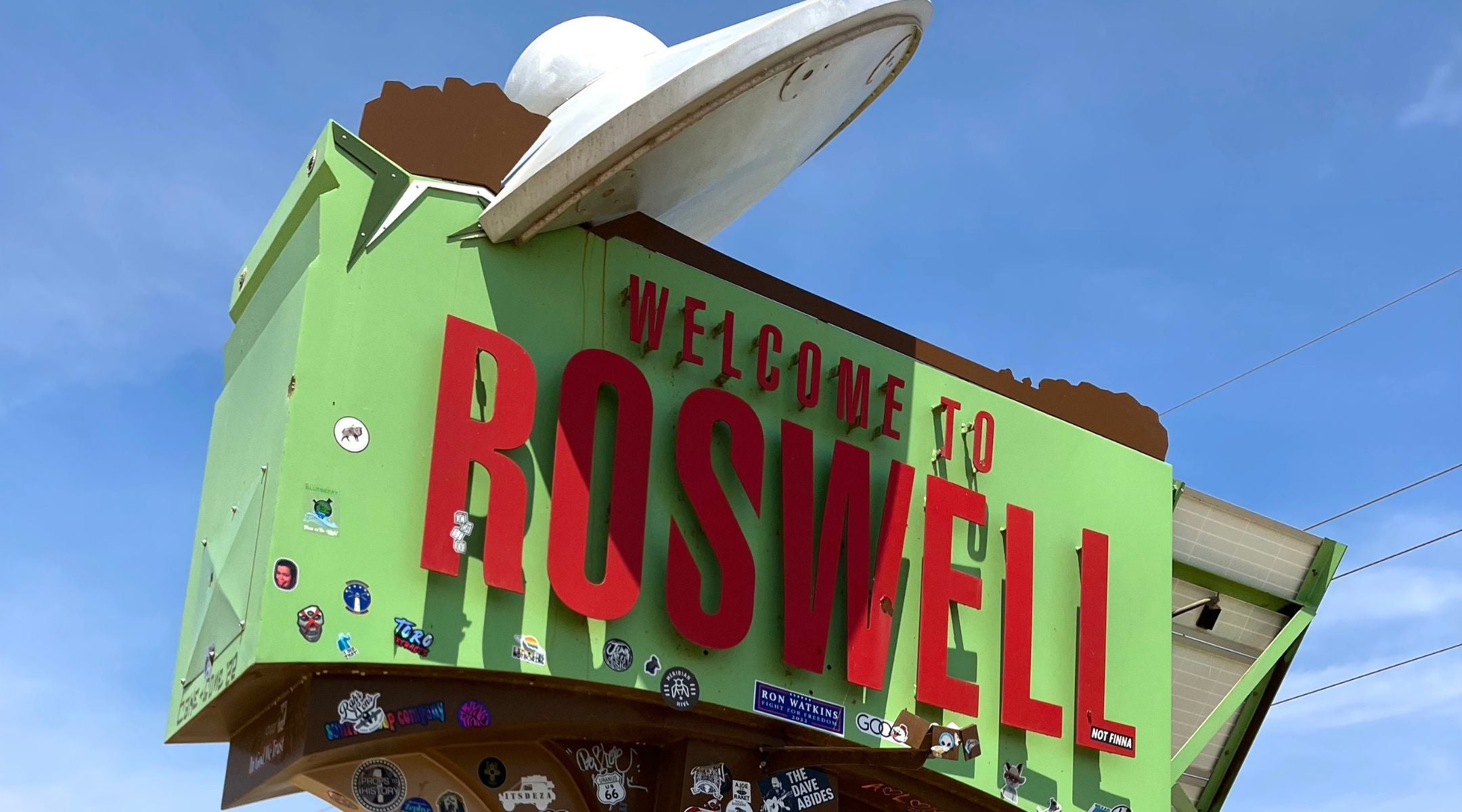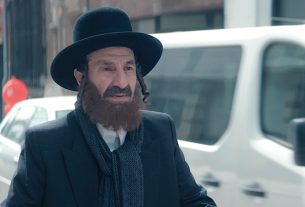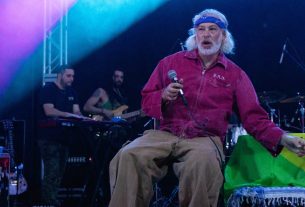ROSWELL, New Mexico — If it weren’t for an Ashkenazi Jew named Stanton T. Friedman, the world might have long ago forgotten what’s come to be known simply as the “Roswell incident.”
Instead, countless books, documentaries and made-for-TV dramas have explored the 1947 discovery of mysterious materials found on a New Mexico ranch that Friedman argued were the relics of extraterrestrials. A wave of successors, including a prominent Israeli-American physicist, continue to press the case for alien contact. And this dusty desert town has been transformed according to an unusual paradox: It’s shaped by conspiracy theories, yet is home to virtually no Jews.
Roswell’s only synagogue, Congregation B’Nai Israel, closed up and moved to Albuquerque five years ago.
“They didn’t have a rabbi and they only met twice a month, on Fridays,” said Leslie Lawner, who made the move with her husband in 2020, reducing Roswell’s tiny Jewish population by two. “There was really nothing we could do for them.”
A granite monument in front of the Chaves County Courthouse in Roswell, New Mexico, displays the Ten Commandments and a Star of David. (Larry Luxner)
The Lawners left behind a town that is largely defined by what happened in the summer of 1947, when local rancher W.W. “Mac” Brazen found rubber strips, tin foil, thick paper and other debris on his property and shared the material with Sheriff George Wilcox of Roswell. The sheriff brought the unusual artifacts to the attention of the Roswell Army Air Field, which on July 9 of that year announced that it had recovered the remains of a “flying disc.”
The outrageous RAAF claim was quickly denounced as erroneous by local military officials who said the debris was actually the wreckage of a crashed weather balloon and related equipment.
That would have been the end of it, if not for Friedman, a nuclear physicist and highly regarded “ufologist” who revisited the incident in the 1970s, devoting the rest of his life to proving the existence of flying saucers. In 1987, Friedman — who died six years ago — told the New York Times that federal officials had engaged in a “cosmic Watergate” to cover up the truth.
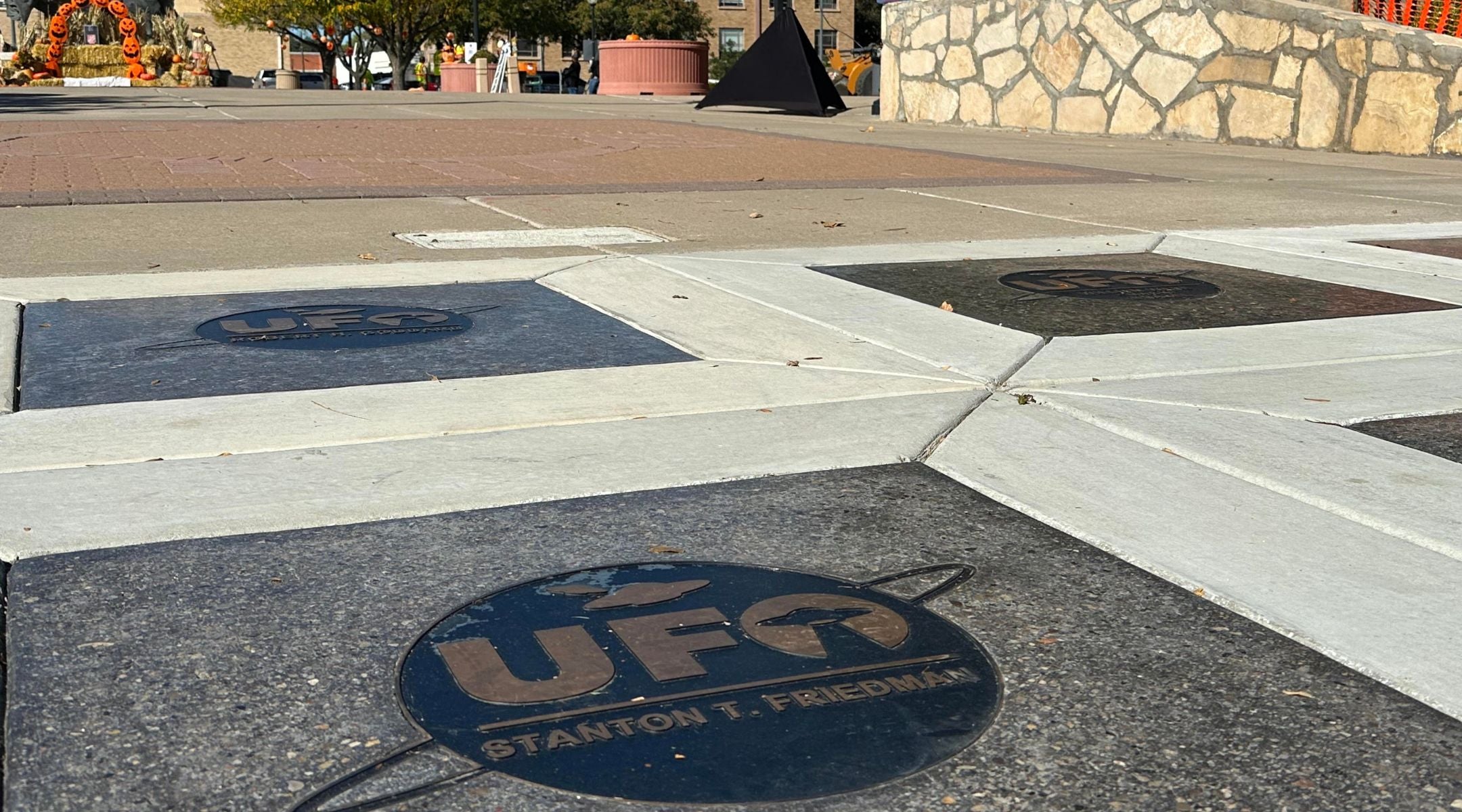
The plaque honoring the late Jewish scientist Stanton T. Friedman and his research on UFOs in downtown Roswell, New Mexico. (Larry Luxner)
Now, this remote city of 47,000, located east of the White Sands Missile Range and about a three-hour drive southeast of Albuquerque, is known for one thing and one thing only: flying saucers.
Here in Roswell, those saucers are ubiquitous — beginning with one atop the “Welcome to Roswell” sign east of town along U.S. 380. There’s also a UFO-shaped McDonald’s, along with a bug-eyed little green alien relaxing under an umbrella in front of the nearby Western Inn.
Another extraterrestrial creature reclines on a bed in the display window of White Mattress, not to mention yet another, even more tacky, E.T. proudly holding up the Dunkin Donuts marquee along Main Street. Not surprisingly, Martians are a common theme in Halloween displays here.
In 1997, the Air Force — attempting to dispel rumors that had persisted for decades — released a 231-page report concluding that alien bodies recovered at the Roswell crash site weren’t aliens at all, but dummies used in parachute tests. It also said that the “spacecraft” that had fallen to Earth on Brazen’s ranch was really an Air Force balloon used in a top-secret program code-named Project Mogul to monitor the atmosphere for evidence of Soviet nuclear tests.
Asked at the time if the new report would finally put the matter to rest, retired Air Force Col. Richard Weaver told NBC’s Today show said: “No, I doubt it. This has become a religion to many people. It’s almost a cult. Certainly, an unbelievable financial opportunity for many folks. So I think this is going to endure.”
Now, the town has taken on added prominence with the Pentagon’s recent establishment of an All-Domain Anomaly Resolution Office. President Donald Trump is a known skeptic of UFOs. But in a 2020 campaign video, he said, “Roswell’s a very interesting place with a lot of people that would like to know what’s going on.”
In a town forged around the religion of aliens, Jewish life is virtually nonexistent. There aren’t enough Jews here to make a minyan — let alone support a synagogue — and the few who did live here have mostly died off or moved away.
Lawner and her husband Bob rarely attended services at Congregation B’nai Israel, located a block from their house at 8th and Washington, during their 27 years in Roswell. But Lawner did help develop a curriculum on Holocaust studies for Sidney Gutierrez Middle School, which she helped found and where she taught for 17 years.
It was an area of inquiry that overlapped with one outlandish but persistent theory about the Roswell incident. Annie Jacobsen claims in her 2012 book, “Area 51: An Uncensored History of America’s Top Secret Military Base,” that just before the Roswell crash, Soviet dictator Joseph Stalin recruited Nazi war criminal Josef Mengele — the infamous Auschwitz “angel of death” — to create “grotesque, child-size aviators” to pilot a plane in order to trigger widespread panic throughout the United States.
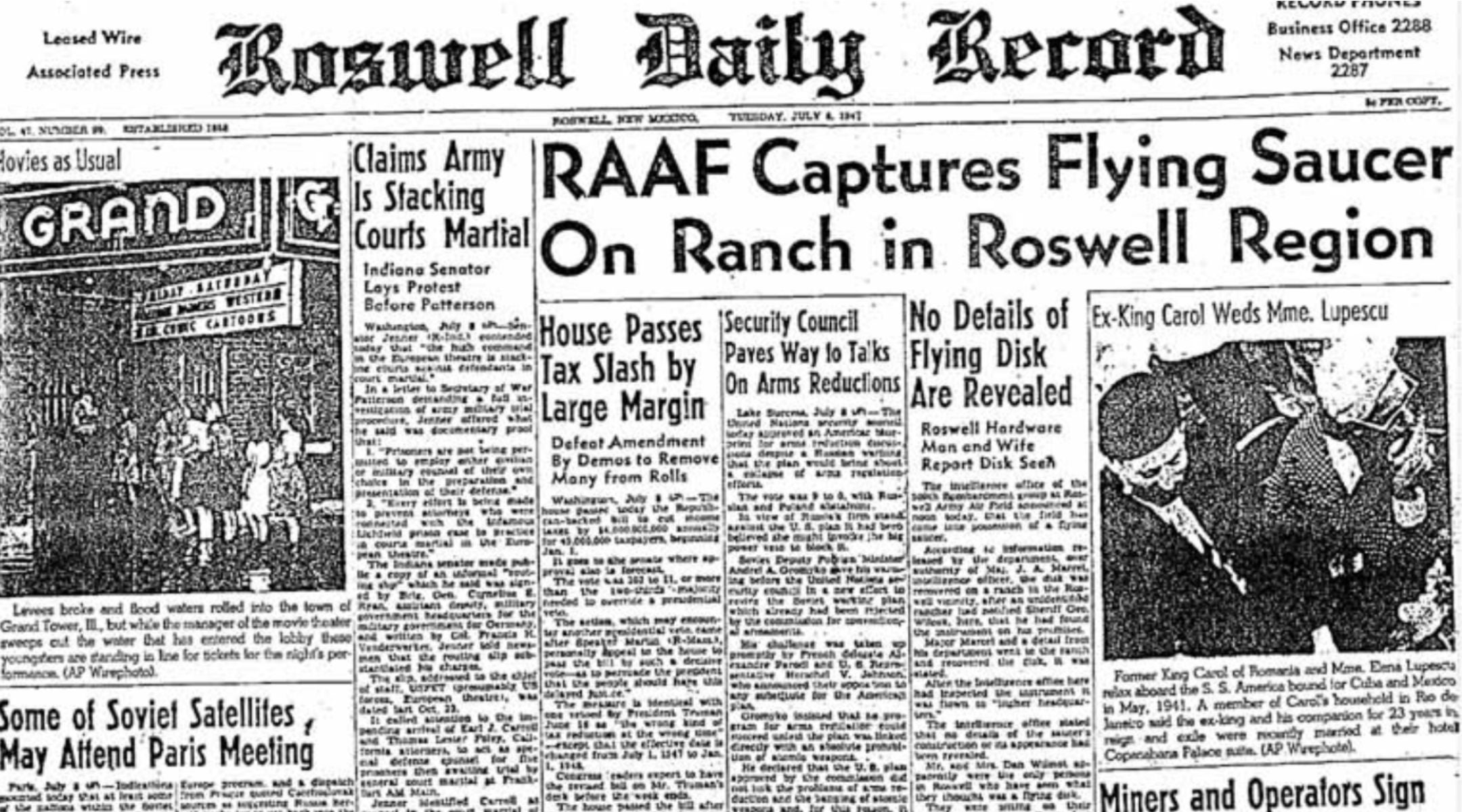
The obsession with aliens has divided Jewish voices. An Orthodox Jewish rabbinical authority, Rabbi Pini Dunner of Beverly Hills, California, has called the Roswell incident “nonsense.”
“Most people don’t believe any of this, nor, for that matter, do we entertain the claims of those who maintain that the Apollo moon landings were all an elaborate hoax, or that Denver International Airport stands above an underground city that serves as a headquarters for the masonically inspired New World Order,” Dunner wrote in an online post. “It’s not that any of these conspiracy stories can be categorically disproved, but we feel they do not need to be. The question is: why would any intelligent person believe such nonsense to be true?”
But some Jews are attached to the idea that aliens are out there — including one of the most prominent scientists making the case today. The Israeli-American physicist Avi Loeb, who runs a lab at Harvard University, argues that some objects and phenomena in space cannot be explained except as evidence of extraterrestrial technology.
Loeb has emphasized the appeal of aliens and space exploration on Jewish grounds. “It is reasonable to imagine the absence of antisemitism in interstellar space,” he wrote earlier this year, noting that anything traveling from the other side of the Milky Way would have had to set out before there were Jews.
This month, Loeb released new data that he said suggested that an object in space that will come within 269 million kilometers of Earth later this year may have extraterrestrial origins. The resulting frenzy has embroiled U.S. transportation officials and even Kim Kardashian.
Loeb’s argument is rooted in theoretical physics. But here in Roswell, aliens are experienced in concrete terms. Factual or not, this past July, Roswell marked 78 years since the mysterious 1947 event, with an annual Roswell UFO Festival that lures thousands of tourists from all 50 states and beyond.
Every year, sidewalk vendors do a brisk business selling funnel cakes, alien salt-and-pepper shakers and other trinkets, while tourists happily pay $5 each to visit the downtown International UFO Museum and Research Center.
“These exhibits are designed not to convince anyone to believe one way or another about their subjects,” says a sign at the museum’s entrance. “Visitors are encouraged to ask questions.”
Local merchants don’t seem to care much what really transpired that night in 1947. They’re just grateful for all the desperately needed cash this festival generates.
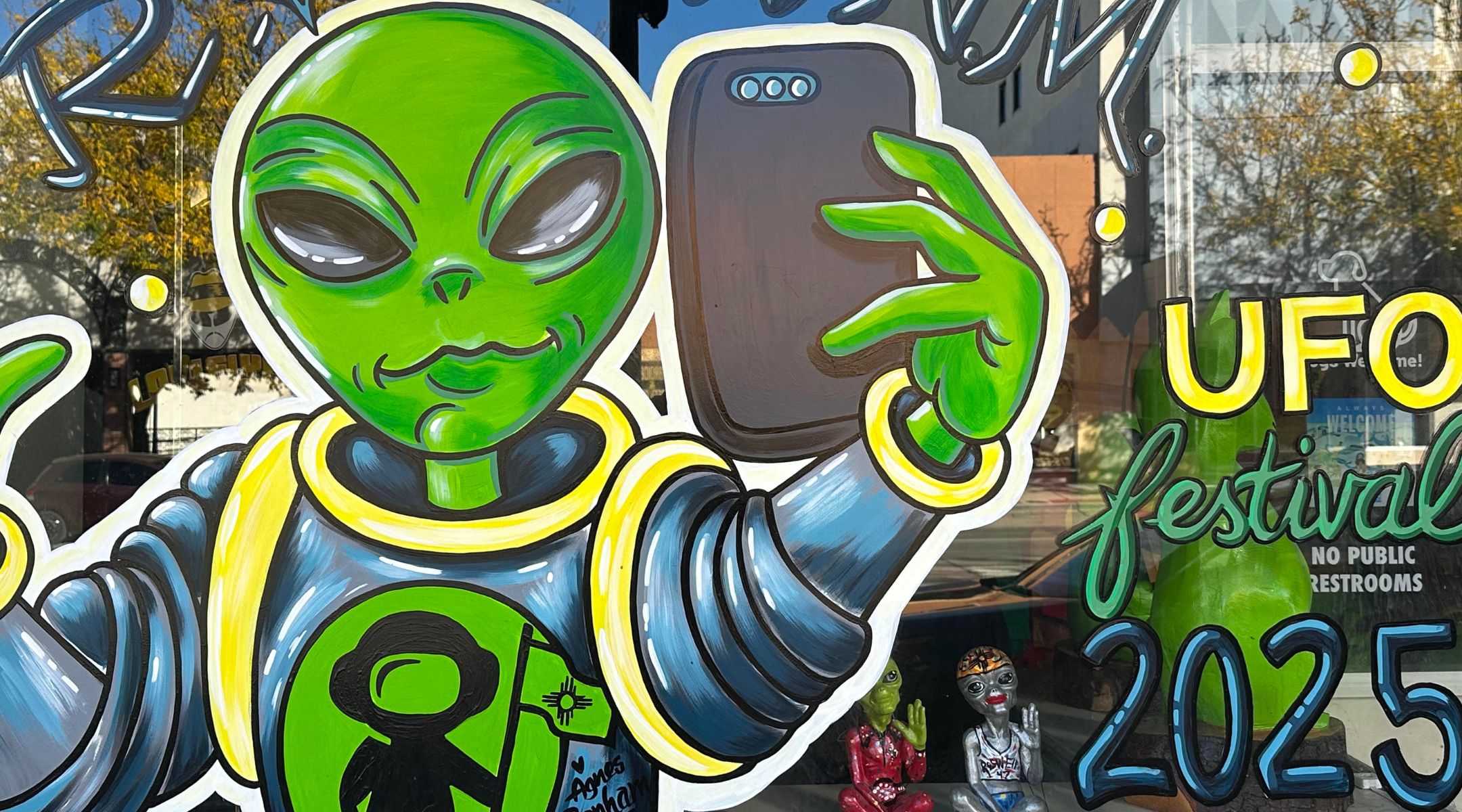
Storefront ad for the 2025 UFO Festival in Roswell, New Mexico. (Larry Luxner)
“Roswell didn’t have a tourist industry and one of my friends was telling me about this UFO stuff. So we started the UFO Festival,” said Tim Jennings, the town’s mayor. “I don’t know what happened, but something definitely happened. It’s not unreasonable. We live out in the middle of the desert, and without a lot of bright lights, at night you can see a lot.”
Added Todd Wildermuth, Roswell’s public information officer: “I don’t have an opinion about it. I haven’t really given it any deep thought.”
To say Roswell is remote is a vast understatement. Some 140 miles from the nearest interstate highway, the town is also unbearably hot and dry. One quickly learns not to go anywhere without a water bottle; it’s even better to stay inside where there’s air-conditioning.
Roswell is certainly not the kind of place to visit if you don’t like reptiles and other poisonous creatures. At the local Home Depot, two of the biggest-selling items, along with plywood and barbecue grills, are Harris Scorpion Killer and Snake-A-Way pellets.
These days, only a handful of Jews remain in Roswell. A Google search for “Roswell” and “Jewish” reveals three synagogues in Roswell, Georgia — a suburb of Atlanta — one of which is a Messianic church.
“There was never a large community here,” said Cymantha Liakos, a Philadelphia native who wasn’t raised as a Jew but recently took a DNA test and discovered she has Jewish ancestry. Liakos, a former geologist, settled in Roswell with her husband, William, a doctor.
Her 23-year-old son, John, a graduate of the nearby New Mexico Military Institute, visited Israel in 2022 as the first Roswell native (and quite possibly the last) ever to participate in Birthright, the program that takes young Jews to Israel on free trips.
Today, the corner structure that had housed B’nai Israel since its establishment in the 1940s is a medical clinic.
“The building was deteriorating and there was no one within the group who knew how to keep it up,” said Judy Stubbs, B’nai Israel’s former treasurer. “Since there was so few of us left, we decided it was in our best interests to sell it.”
The community’s Torah, meanwhile, has found a new home at Congregation Nahalat Shalom in Albuquerque, New Mexico’s largest city and home to many of the state’s estimated 25,000 Jews. In 2018, Roswell’s dwindling Jewish community agreed to “indefinitely loan” Nahalat Shalom the sacred scroll, which had been rescued from a small town in Czechoslovakia by the Karnowsky family during World War II.
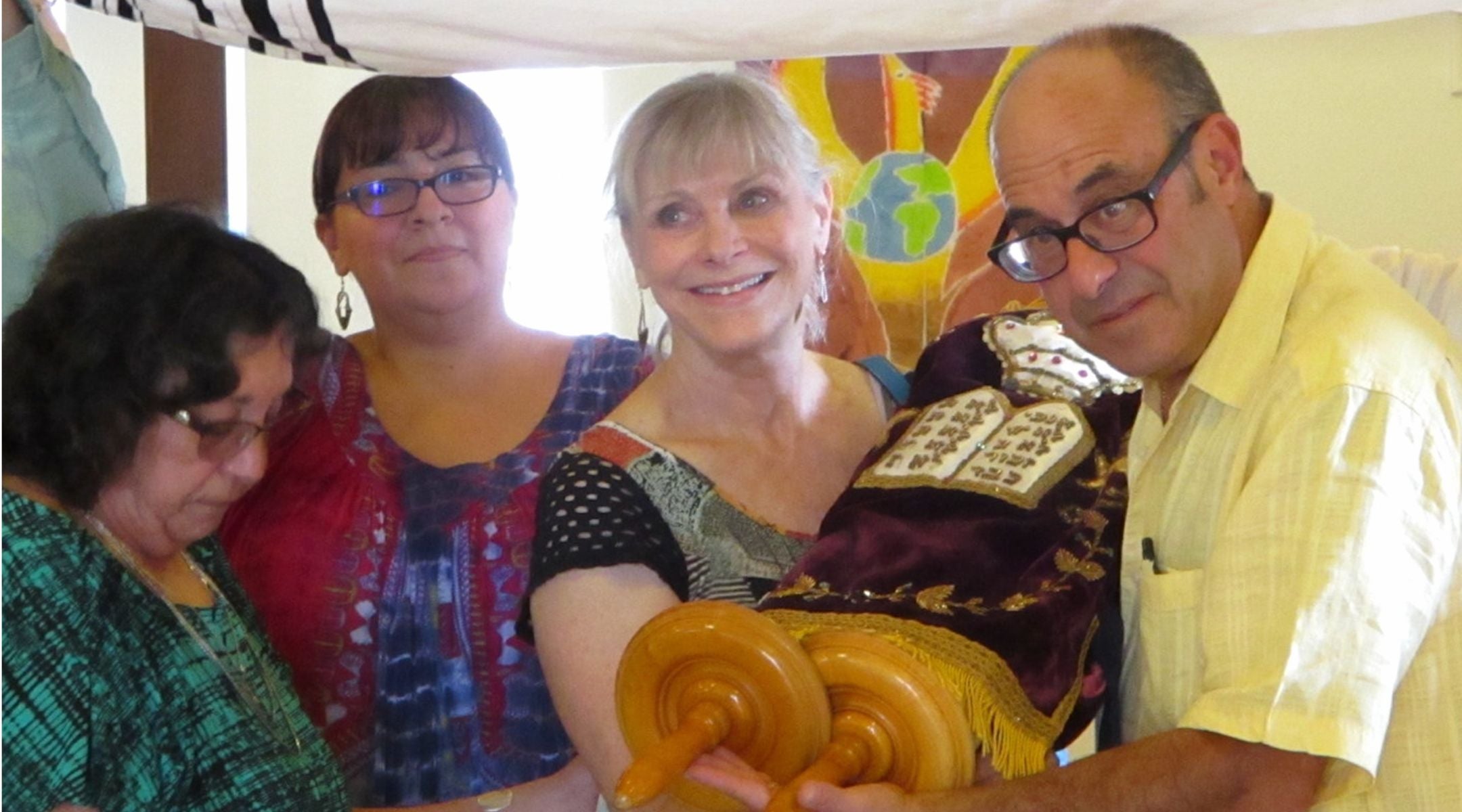
Roswell’s Jewish community agreed to “indefinitely loan” a synagogue in Albuquerque their sacred scroll in 2018. (Courtesy)
In 2018, Nahalat Shalom’s spiritual leader, Rabbi Min Kantrowitz, led a special Simchat Torah dedication service in the presence of Kathryn Karnowsky and her Jewish friends from Roswell.
So what do the handful of Jews remaining in Roswell think about the 1947 “incident” that made their town famous?
“My husband is from a ranching family with longtime roots in this area, and all of their ranch neighbors strongly believe it is not a hoax,” said Liakos. “There was an incident, and a government cover-up. Both of us are scientists, and we’re not shrugging it off as ridiculous.”
Stubbs, a longtime resident of Roswell and former city council member, agrees with her friend.
“People ask me that all the time,” said Stubbs, who remains active in politics. “With all the continued hype, I believe something must have happened. A lot of people come here to find out, but no one has the answer. Unless the federal government chooses to open the records, it’s a question that will never be answered.”
Power the news that matters to you. Before 2025 ends, help (JR)’s independent, award-winning newsroom document Jewish history in real-time.
Keep Jewish Stories in Focus.
(JR) has documented Jewish history in real-time for over a century. Keep our journalism strong by joining us in supporting independent, award-winning reporting.

